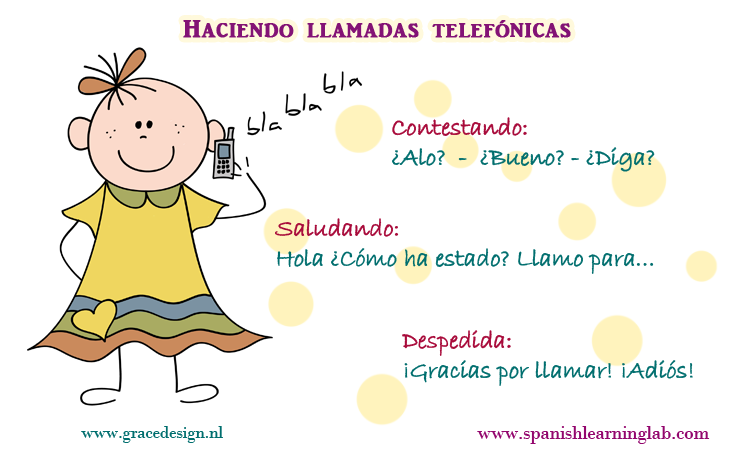“Aló” is often the starting phrase for many phone calls in Spanish. Just like in other languages, there are important expressions you can learn to answer the phone correctly or take a simple message for a friend or relative. This lesson will cover a few of these key phrases and questions through examples of phone conversations in Spanish and interactive exercises for practice. Let’s start…
Common phrases and questions in phone conversations Spanish
A home phone is called a “teléfono convencional” or “teléfono domiciliar,” and our personal phone is often called a “teléfono celular“” or “teléfono móvil” Smartphones are often translated as “teléfono inteligente,” although most people would understand if you say “smartphone.”
In order to answer the phone in Spanish, we normally use phrases like “Aló” (hello), “Hola” (hello), Diga (hello, tell me), Bueno (hello). Know that the expressions people use to pick the phone may vary from one country to another, but a simple HOLA may work anywhere. In fact, greetings play an important role in phone conversations in Spanish too, so make sure you know some of them.

Some verbs like LLAMAR (to call), DECIR (to say) and HABLAR (to talk) are very useful in Spanish telephone conversations in expressions such as:
- “Te llamo porque hoy tienes cita con el médico” (I am calling because you have an appointment with the doctor.)
- “Llamaba para saber cómo estás.” (I just called to know how you are doing.)
The verb DECIR, on the other hand, is frequently used as a complement of LLAMAR in reflexive forms like DECIRTE and DECIRLE, for example: “Llamo para decirte…” and “Llamaba para decirle…”. DECIR is useful to leave phone messages as well, with the verb in its forms DÍGALE (tell him/tell her) and DILE (tell him/tell her).
Examples of short phone calls in Spanish
Conversation No. 1
- Ariana: ¿Aló?
- Roger: Hola Ariana. ¿Cómo estás?
- Ariana: Muy bien Roger. Dime.
- Roger: Llamo para decirte que hoy es la fiesta de cumpleaños de Gabriel y estás invitada.
- Ariana: Gracias por invitarme. Ahí estaré.
- Roger: Te esperamos. Es a las 2 de la tarde.
- Ariana: Está bien. Hasta pronto.
The verb HABLAR will be needed to say who is calling up and also to say the reason of the phone call in Spanish, e.g. : “Hablo para…”, “Estoy hablando para…” and “Hablaba para + purpose”. Remember you can also use the verbs LLAMAR and HABLAR in the past tense as LLAMÉ and HABLÉ.
Conversation No. 2
- Ariana: ¿Aló? ¿Podría hablar con Carlos?
- Juan: Un momento por favor.
- Carlos: ¿Aló?
- Ariana: Hola Carlos, habla Ariana. Llamaba para preguntarte si recibiste mi mensaje
- Carlos: Sí Ariana, lo recibí. Gracias por llamar ayer
Useful Spanish expressions and questions for phone conversations
Some expressions and questions you may find useful for phone conversations in Spanish are:
- Espere un momento, por favor. (Please wait a moment.)
- Deme un minuto, por favor. (Give me a minute, please.)
- ¿Puedo hablar con María? (Can I speak to Maria?)
- ¿Algún mensaje? (any message?)
- ¿Quiere dejar algún mensaje? (Do you want to leave any message?).
When your call is about to end, you will need expressions like GRACIAS, ADIÓS, NOS VEMOS and other common farewells. Here are a few examples of phone conversations, including some of the expressions and verbs we have covered so far and a few others.
Conversation No. 3
- Ariana: ¿Bueno?
- Roger: Sí, buenas tardes. Ariana, llamo para saber si usted tiene mi libro de poesía
- Ariana: Sí Roger… Aquí está. Ayer llamé a su casa para decir que olvidó su libro aquí.
- Roger: Uff… pensé que lo había perdido. Gracias por guardarlo. Llegaré mañana.
- Ariana: Está bien. ¡Hasta pronto!
Conversation No. 4
- Ariana: ¿Aló? ¿Está Lila?
- Roger: No está ahorita. ¿Algún mensaje?
- Ariana: Sí, habla Ariana. Dígale a Lila que mañana es mi cumpleaños y está invitada a venir a mi fiesta.
- Roger: Muy bien, yo le digo. No se preocupe.
- Ariana: Muchas gracias. Que tenga buen día.
Conversation No. 5
- Ariana: ¿Diga?
- Roger: Sí, disculpa Ariana, solo llamaba para decirte que hoy es el concierto.
- Ariana: ¿En serio? Lo olvidé. Gracias por llamarme Roger.
- Roger: De nada. Nos vemos ahí entonces.
- Ariana: Está bien. Chao.
Another common question in Spanish phone conversations is ¿Se encuentra + name of the person?, for example: ¿Se encuentra Ana?. A more informal way to ask would be ¿Está Ana? Oftentimes, you will hear the questions ¿De parte de quién?, ¿De parte? or ¿Quién habla?, meaning “who is calling?”.
Interactive exercise:
Link these common Spanish phone call questions with the most appropriate response. Then, check your answers.
Listening Activity No. 1: Having a telephone conversation in Spanish
Key expressions in the conversation:
- “Estaba pensando en…” means “I was thinking of…”
- “Solo llamaba para decirte…” means “I was calling to tell you that…”
- “¿A qué hora es?”, means “What time is it?”
